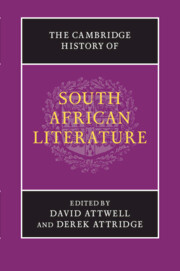Book contents
- Frontmatter
- Introduction
- PART I ORATURES, ORAL HISTORIES, ORIGINS
- PART II EXPLORATION, EARLY MODERNITY AND ENLIGHTENMENT AT THE CAPE, 1488–1820
- PART III EMPIRE, RESISTANCE AND NATIONAL BEGINNINGS, 1820–1910
- PART IV MODERNISM AND TRANSNATIONAL CULTURE, 1910–1948
- PART V APARTHEID AND ITS AFTERMATH, 1948 TO THE PRESENT
- PART VI SOUTH AFRICAN LITERATURE: CONTINUITIES AND CONTRASTS
- 33 South Africa in the global imaginary
- 34 Confession and autobiography
- 35 ‘A change of tongue’: questions of translation
- 36 Writing women
- 37 The experimental line in fiction
- 38 The book in South Africa
- 39 Literary and cultural criticism in South Africa
- Index
- References
35 - ‘A change of tongue’: questions of translation
from PART VI - SOUTH AFRICAN LITERATURE: CONTINUITIES AND CONTRASTS
Published online by Cambridge University Press: 28 January 2012
- Frontmatter
- Introduction
- PART I ORATURES, ORAL HISTORIES, ORIGINS
- PART II EXPLORATION, EARLY MODERNITY AND ENLIGHTENMENT AT THE CAPE, 1488–1820
- PART III EMPIRE, RESISTANCE AND NATIONAL BEGINNINGS, 1820–1910
- PART IV MODERNISM AND TRANSNATIONAL CULTURE, 1910–1948
- PART V APARTHEID AND ITS AFTERMATH, 1948 TO THE PRESENT
- PART VI SOUTH AFRICAN LITERATURE: CONTINUITIES AND CONTRASTS
- 33 South Africa in the global imaginary
- 34 Confession and autobiography
- 35 ‘A change of tongue’: questions of translation
- 36 Writing women
- 37 The experimental line in fiction
- 38 The book in South Africa
- 39 Literary and cultural criticism in South Africa
- Index
- References
Summary
Speaking from a South African point of view, translation, or a ‘change of tongue’ (in the words of the multilingual poet and self-translator Antjie Krog) is both a mode of being in the colony/postcolony as well as a form of writing. That is to say, before one is able to talk meaningfully about translation as an act of writing and as a way of delivering literary-symbolic goods, one must first go into what Zoë Wicomb, relying on J. M. Coetzee, calls the ‘yard of Africa’ (‘Translations’, p. 209) and pick one's way through the uneven trading of identity via language and the fraught ‘translation’ of subjectivities in that ‘yard’ of colonisation and its aftermath.
Indeed, colonisation and its cognate, conflict, are what yield writing in Southern Africa, as Michael Chapman has argued (Southern African Literatures, pp. 1–16). It is an established article of knowledge in southern African studies that prior to the 350 or so years of colonial and neocolonial rule in this region, non-literate or oral cultures held sway. And, when the Book arrived on the shores of the Cape, along with the printing press, it was centrally implicated in a process of ‘conversion’ that by now has been well documented: ‘heathens’ and ‘barbarians’ had to be pacified and induced into a culture in which they would, by indoctrination, inculcation and violence, both physical and epistemic, become receptive to book learning.
- Type
- Chapter
- Information
- The Cambridge History of South African Literature , pp. 739 - 756Publisher: Cambridge University PressPrint publication year: 2012
References
- 2
- Cited by

